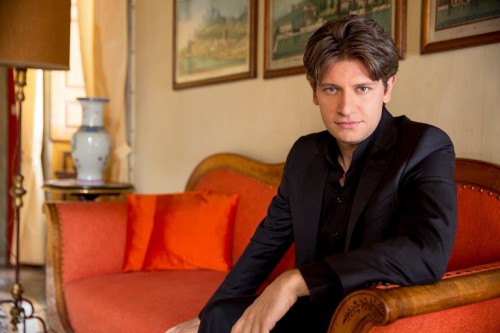 Switzerland Mozart, R. Strauss, Shostakovich: Francesco Piemontesi (piano), Philharmonia Zurich / Daniele Rustioni (conductor). Zurich Opera, Zurich, 28.10.2018. (JR)
Switzerland Mozart, R. Strauss, Shostakovich: Francesco Piemontesi (piano), Philharmonia Zurich / Daniele Rustioni (conductor). Zurich Opera, Zurich, 28.10.2018. (JR)

Mozart – Rondo in A major for piano and orchestra K.386
R. Strauss – Burleske in D minor for piano and orchestra
Shostakovich – Symphony No.5. Op.47
This was Zurich’s opera house season’s opening Sunday morning ‘Philharmonic concert’, not under the baton of their Chief Conductor Fabio Luisi but with young Italian conductor Daniele Rustioni. Rustioni, Chief Conductor at the Lyon Opera and Orchestra della Toscana, has conducted some opera productions here (Cav and Pag and Butterfly) to great acclaim. Fabio Luisi looked on, from a box, beaming regularly.
The piano was central to the concert’s first half, a Mozart Rondo written when Mozart first arrived in Vienna in 1782. No one is quite sure whether the piece ever formed part of a piano concerto. The manuscript was partly lost over the centuries and only fully re-discovered lately. It proved an undemanding (except for a few cascades) seven-minute amuse-gueule, effectively a warm-up for the soloist and orchestra.
Richard Strauss’s Burleske for piano and orchestra was meatier fare. In 1885 Strauss, at the tender age of 21, was assisted by the conductor Hans von Bülow to be appointed Kapellmeister in Meiningen. There he met Brahms and became acquainted with the music of Liszt and Wagner. The Burleske was composed soon after his arrival and displays a number of styles and influences. For such a young man’s work, it is highly technically accomplished, though Strauss himself rejected it much later as ‘pure rubbish’ and ‘miserably orchestrated’. It was premièred in 1890 by Eugen d’Albert, by which time it had been overshadowed by Don Juan and Tod und Verklärung, composed one and two years earlier respectively.
Numbers on stage doubled for the Strauss. Swiss pianist Francesco Piemontesi was as impressive in the faster, rhythmic passages as in the tender interludes. The piece is virtually a piano concerto, requiring not inconsiderable technical bravura. The timpanist (Norbert Himstedt) was kept particularly busy, often in solo dialogue with the pianist. Mop-headed Rustioni accompanied enthusiastically, frequently hopping with boyish energy, or swaying elegantly. The orchestra clearly warmed to him, and he to them. Strauss’s wit came through at the end with some pianistic growls.
Two encores: first Daniele Rustioni joined Piemontesi at the keyboard for part of a Mozart sonata, and then Piemontesi on his own bid farewell with some restrained Bach.
The jewel-box opera house almost proved too small a space for a blistering account of the Shostakovich symphony. The work was written after Stalin had denounced Shostakovich in ‘Pravda’ for being too modernist, having just heard his opera Lady Macbeth of Mtsensk. The composer, fearing for his life, quickly put his as yet unperformed Fourth Symphony in a drawer for later retrieval, and set about writing a symphony to appease the apparatchiks. Anyone coming to this symphony without doing their homework or reading the programme will enjoy what they hear at a superficial level but not understand the background and not so subtle political message. Stalin himself was unsure of the message but approved of the work; the Russian people understood.
There was much urgency in the performance; Rustioni conducted with Italianate passion and youthful energy. The orchestra’s playing was of the highest order throughout. The strings may be a trifle thin, but there are plenty of impressive Principals in the woodwind: I highlight Maurice Heugen (flute), Bernhard Heinrichs (oboe) and Rita Karin Meier (clarinet).
The first movement’s martial attack was ferocious; a pity the piano’s opening contribution was not in time with the conductor. The repose of the second movement was moving (apparently at the première some members of the audience were moved to tears); there was no holding back of volume in the louder section. The final militaristic onslaught thrilled us with its (fake) jubilation. Ear-splitting trumpets and the thump of the bass drum added to the visceral excitement. The orchestra clearly loved it, being a far cry from their usual accompaniment of opera singers. On a cold damp Sunday morning, we had enjoyed it too.
John Rhodes
